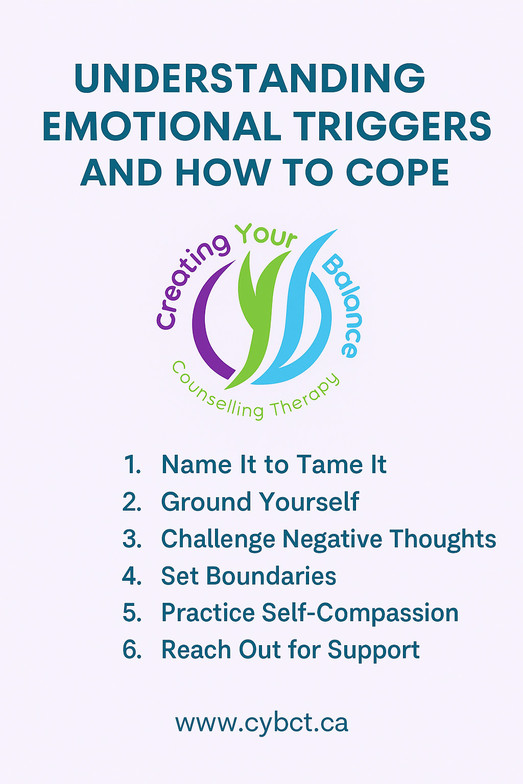
By Creating Your Balance Counselling Therapy
Emotions are essential to the human experience. They inform us, guide decisions, and deepen our relationships. But sometimes, we find ourselves reacting strongly or unexpectedly to seemingly minor events. These intense emotional responses are often the result of emotional triggers—deep-seated psychological cues that activate unresolved pain or fear. Understanding emotional triggers and learning how to cope with them is a powerful step in cultivating emotional balance and well-being.
What Are Emotional Triggers?
Emotional triggers are internal reactions to external stimuli—people, places, words, smells, sounds, or even memories—that evoke a strong emotional response, often rooted in past experiences or trauma. These responses can include anger, sadness, anxiety, shame, or even a sense of panic. They are typically disproportionate to the present situation because they are connected to deeper emotional wounds or unmet needs from the past (Ford & Courtois, 2013).
For example:
-
A raised voice may trigger anxiety in someone who experienced verbal abuse.
-
A dismissive comment may evoke shame in someone who struggled with neglect.
-
Rejection or abandonment—real or perceived—may spark overwhelming fear in someone with attachment wounds.
Why Do Emotional Triggers Happen?
The brain is wired for survival. When something feels emotionally dangerous or reminds us of a painful experience, the amygdala (the brain's fear center) can take over, initiating a fight, flight, or freeze response (Van der Kolk, 2014). This response is automatic, often bypassing our rational thinking. Over time, these reactions become conditioned, meaning the brain learns to associate specific cues with emotional distress.
Common Emotional Triggers
While everyone is different, some common emotional triggers include:
-
Feeling ignored, rejected, or excluded
-
Being criticized or judged
-
Experiencing loss of control or uncertainty
-
Being reminded of past trauma
-
Feeling disrespected or invalidated
-
Fear of failure or disappointment
Coping with Emotional Triggers: 6 Strategies
Understanding and managing emotional triggers is a process that takes time, compassion, and support. Here are six evidence-informed strategies to help cope:
1. Identify Your Triggers
Keep a journal of situations where you experience strong emotional reactions. Ask yourself:
-
What happened?
-
What emotion did I feel?
-
What past experiences might be influencing this reaction?
Awareness is the first step toward healing.
2. Practice Grounding Techniques
When you're triggered, your nervous system may enter a state of dysregulation. Grounding techniques like deep breathing, progressive muscle relaxation, or sensory awareness can help bring you back to the present moment (Linehan, 2015).
Try the 5-4-3-2-1 technique:
-
Name 5 things you can see
-
4 things you can feel
-
3 things you can hear
-
2 things you can smell
-
1 thing you can taste
3. Challenge Your Inner Dialogue
Our self-talk often fuels emotional intensity. Try to notice any cognitive distortions, such as catastrophizing or personalization, and replace them with more balanced thoughts. This approach is rooted in Cognitive Behavioural Therapy (CBT), which is proven to reduce emotional reactivity (Beck, 2011).
4. Set Boundaries
Triggers often arise in relationships, particularly when personal boundaries are crossed. Learning to identify and assert your needs clearly and respectfully can reduce the likelihood of being triggered and improve emotional safety.
5. Use Self-Compassion
Being triggered doesn't mean you're weak—it means you're human. Practice self-compassion by acknowledging your feelings without judgment. Research shows that self-compassion reduces emotional distress and increases resilience (Neff, 2011).
6. Seek Professional Support
Therapy provides a safe, supportive space to explore your emotional landscape. A skilled therapist can help you uncover the roots of your triggers, process unresolved emotions, and develop healthier coping strategies.
At Creating Your Balance Counselling Therapy, we believe that you are the expert in your own life. Our compassionate, client-centered approach is designed to support you in gaining insight, building resilience, and finding your emotional balance.
Final Thoughts
Emotional triggers are not signs of weakness—they are signals from your inner world, asking to be heard and healed. With understanding, compassion, and the right support, you can learn to navigate emotional challenges and build a life rooted in self-awareness and inner peace.
Ready to begin your healing journey?
Contact us today at www.cybct.ca to book a session or learn more about our counselling services in Dartmouth, Nova Scotia.
References:
-
Beck, J. S. (2011). Cognitive Behavior Therapy: Basics and Beyond. Guilford Press.
-
Ford, J. D., & Courtois, C. A. (2013). Treating Complex Traumatic Stress Disorders in Adults: Scientific Foundations and Therapeutic Models. Guilford Press.
-
Linehan, M. M. (2015). DBT Skills Training Manual. Guilford Press.
-
Neff, K. D. (2011). Self-Compassion: The Proven Power of Being Kind to Yourself. William Morrow.
-
Van der Kolk, B. A. (2014). The Body Keeps the Score: Brain, Mind, and Body in the Healing of Trauma. Viking.
About Creating Your Balance Counselling Therapy Creating Your Balance Counselling Therapy offers professional mental health support in Dartmouth, Nova Scotia. Our team provides a safe, supportive space for individuals seeking to improve their emotional wellness and navigate life's challenges.
Ready to begin your healing journey? (902) 420-6934 admin@cybct.ca www.cybct.ca
Follow us on social media for resources and inspiration:
Instagram: @creatingyourbalance
Facebook: @CYBCounsellingTherapy
This article is for informational purposes only and does not constitute professional advice. Please reach out directly to discuss your specific therapeutic needs.
#CreatingYourBalance #CYBTherapy #MentalHealthMatters #DartmouthTherapist #FindYourBalance #Maletherpaist #CouplesCounselling #FamilyCounselling





